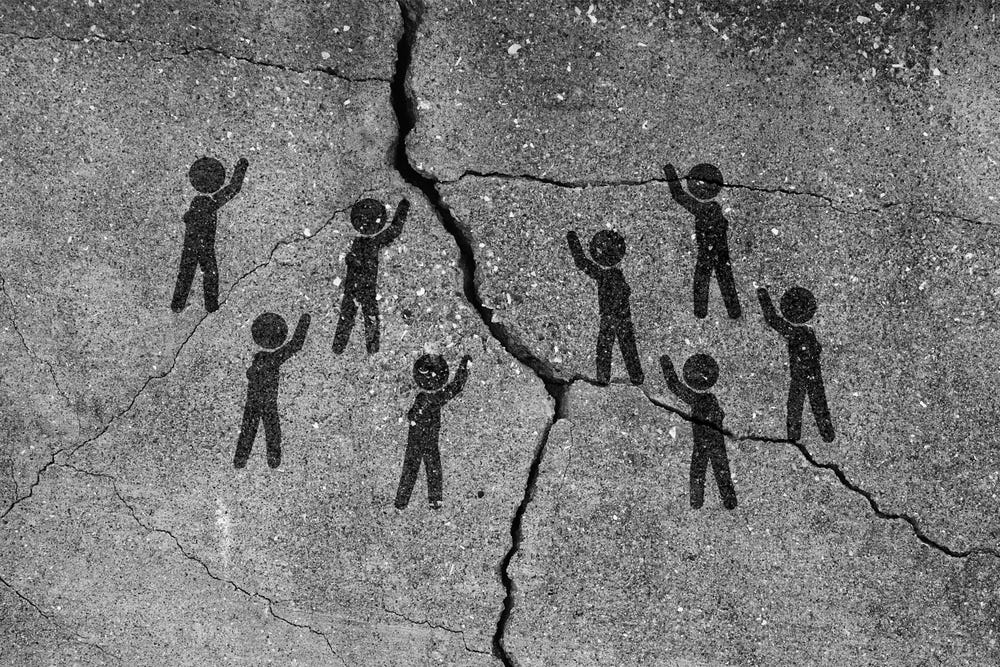E-Pluribus | October 27, 2023
The plague of universities and public positions; multiculturalism, tribalism and Hamas; and Anti-Zionism vs. Antisemitism - an illusion?
A round-up of the latest and best musings on the rise of illiberalism in the public discourse:
Tom Ginsburg: The Case for University Silence
Numerous prestigious universities have found themselves in hot water for their silence in the wake of Hamas’s attack on Israel in early October. Writing at Persuasion, Tom Ginsburg says the schools have no one to blame but themselves for creating the expectation that they would be quick to voice condemnation. Ginsburg argues that a return to “institutional neutrality” is the way to go, assuming the genie can be put back in the bottle.
The current crisis is of the universities’ own making. They have backed themselves into a corner by putting themselves forward in recent years as moral leaders with the authority to speak for their institutions, allowing themselves to be drawn into various controversies. The large number of universities which condemned the Russian invasion of Ukraine, the University of California’s statement criticizing the Dobbs decision (although it did not directly affect abortion access in California), and myriad statements in response to George Floyd’s death are examples of the proliferation.
More egregious are the spread of statements by university departments. The University of California system recently blessed this practice, even though they almost by definition proclaim an orthodoxy and discourage junior faculty and graduate students from themselves inquiring into the relevant issues. (It takes a great deal of courage to depart from the line promulgated by one’s department.) In practice, these statements have focused disproportionately on Israel. The UC Santa Cruz Feminist Studies Department, for example, informs us that “Palestine is a feminist issue.” UC Davis’ Asian American Studies Department just endorsed a statement calling upon the UC system to “retract its charges of terrorism, to uplift the Palestinian freedom struggle, and to stand against Israel’s war crimes against and ethnic cleansing and genocide of the Palestinian people.” The conclusion here is that, once institutions get in the habit of issuing statements, there is no obvious way to stop the process—as the virtual mutiny of Davis’ Asian American Studies Department from the UC system makes clear.
Universities would do well to return to an older approach, pioneered by the University of Chicago and characterized as “institutional neutrality.” The phrase stems from the Kalven Report (adopted in 1967), although the principle in force goes back to at least 1899. The guiding idea is that the university, as such, is simply the home of scholars and students, not itself an entity to pronounce on matters of the day.
Read the whole thing.
Philip Carl Salzman: Multiculturalism Begets Tribalism: Hamas in Our Universities
The all-too-enthusiastic support on college campuses for Hamas has prompted Philip Carl Salzman at Minding the Campus to examine how multiculturalism has contributed to the tribalistic thinking currently on display. The oppressor versus oppressed worldview quickly leads to choosing sides, even if the side you’ve chosen commits horrible acts in the name of “resistance.”
. . . Jew hatred in our universities rests on two updated academic theories: Marxist-Leninist “postcolonial theory” and critical race theory. Postcolonial theory rightly states that imperial conquest and colonial occupation has a major deleterious effect on the indigenous population. But then, quite oddly, asserts that all worldly problems are due to European imperialism and only European imperialism. The world’s long history of many imperial states, including current non-European ones, is ignored. No mention is made of Islamic imperialism in which Bedouin tribes from Arabia conquered and occupied half the known world, from Arabia to the Mediterranean, from India to Morocco, from the Maghreb to Sicily and Iberia. Nor do we hear of China’s current imperialism and colonialism in Tibet, Chinese Turkistan, and Inner Mongolia, and now grasping out across the Pacific. No, only Europeans are to blame.
Postcolonial theory is the most popular and dominant theory in anthropology—even archaeologists claim adherence to this new gospel. The contamination has spread to all of the other social sciences. The application of this theory to Israel takes considerable contortions, given that Jews were the indigenous population when Rome invaded, that Jews in the diaspora were subjugated, and that Israel was founded by homeless refugees as part of a liberation movement of the Jewish people. Nonetheless, Israel is characterized by postcolonial theorists as a colonial settler state that oppresses the “indigenous” Palestinian population, most of whom came from Syria and Egypt in recent times.
Critical race theory, a neo-Marxist racial class theory, hits both Israel and Jews everywhere. In Israel, Jews are classified as whites and Palestinians as “people of color,” although many Jews are of Middle Eastern origin and are physically indistinguishable from Palestinians, who have always been classified as white. The truth is that Arabs look down on people of color, called them “abeed,” slaves—a historical and racist remnant of the vast Arab slave raids of Africa. This application of American racial categories is nonsense, but serves to activate BIPOC (black, indigenous, people of color) against Israel.
Critical race theory also vilifies Jews everywhere, classing them as white, white adjacent, or hyperwhite, and therefore obvious oppressors of BIPOC. It is odd that Jews were only recognized as white once it became a bad thing. So Jews, like whites, are deemed oppressors on campus, and increasingly excluded and attacked. But Jewish supporters of Israel get both barrels as oppressors at home and abroad.
Read it all.
Kevin D. Williamson: Anti-Zionism Is Antisemitism at Scale
At The Dispatch, Kevin Williamson pulls no punches in his analysis of the opposition to Israel in its struggle against Hamas. Williamson says the “some of my best friends are Jews” but-Israel-must-go defense rings just as hollow as ever.
I sometimes think of that distinction when people who justify anti-Israeli barbarism protest that they are not anti-Jew but anti-Zionist. I am sure that Rep. Rashida Tlaib would be happy to tell you that some of her best friends are Jews, and that may even be true. Anti-Zionists don’t hate Jews on a one-by-one basis—they hate them on a corporate basis—not as neighbors but as a nation.
I am not sure that is the high moral ground that the anti-Zionists think it is.
The well-scrubbed anti-Zionists you meet on Ivy League campuses and in polite salons are careful never to make openly essentialist arguments about Jews. Nobody wants to sound like Henry Ford or George Lincoln Rockwell. But try as they might to root their arguments in history or political economy or “anti-colonialism,” the anti-Zionists in the end always end up making the case that the Jews are a special class of people who must endure special disadvantages: Other peoples have the right to aspire to self-determination, but not the Jews; other peoples have a right to self-defense, but not the Jews; other peoples deserve the protection of the rule of law and international norms, but not the Jews; etc.
The anti-Zionist view of the Palestinians is hardly any less essentialist. Other peoples—the Jews of Israel above all—must be expected to behave decently even when engaged in warfare, but not the Palestinians, who simply cannot help themselves when it comes to, say, gang-raping Jewish hostages to death or decapitating Jewish children; the Palestinians are practically unique among the world’s people in that their refugee status is understood to be eternally heritable, as though the Arabs of Palestine had not themselves arrived there as conquerors but rather had sprouted from the ground like mushrooms; other peoples are expected to take collective responsibility for their communities, but the Palestinians apparently are destined to be eternal wards of the United Nations and international philanthropists.
Read it all here.
Around Twitter (X)
A warning from Colin Wright about "decolonization":
Chris Deaton, Weekly Standard contributor and current communications director for the Unite America PAC, makes some cogent observations about the dangerous direction the office of president has taken in this country:
And finally, a sobering admission from Brianna Wu, software engineer, entrepreneur, and women's rights advocate, regarding antisemitism on the left:









